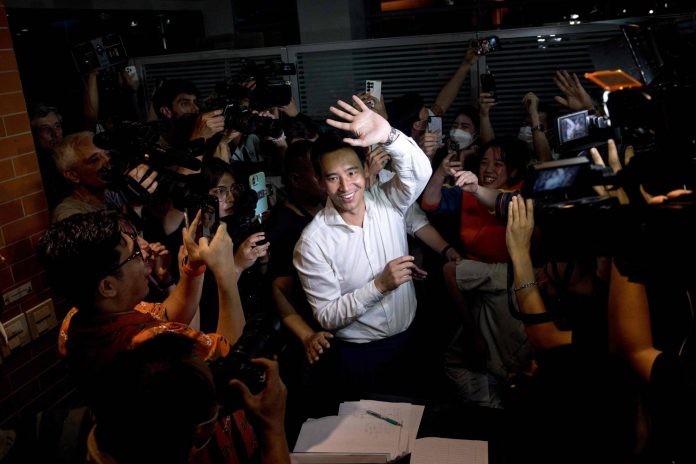In a nationwide election on Sunday, Thai opposition parties emerged victorious, dealing a significant blow to the military-backed establishment governed by the 2014 coup. This outcome reflects years of mounting frustration among voters over the conservative cliques’ governance in the country.
The election witnessed an unprecedented surge in voter turnout, as citizens heeded the call for change. This sets the stage for a potentially dramatic showdown as parties now vie for coalition support to form a government under a junta-era constitution, which still grants the military considerable influence.
With over 99% of votes counted, the progressive Move Forward party is projected to secure 151 seats, placing them in the lead, followed by the populist Pheu Thai party with 141 seats.
This substantial lead places the opposition well ahead of the incumbent Prime Minister, Prayut Chan-o-cha, who led the 2014 coup.
In the early hours of Monday, Pita Limjaroenrat, the leader of the Move Forward party, who gained significant support from the youth through social media, expressed his preparedness to assume leadership.
“We believe that our beloved Thailand can be better, and change is possible if we start today … our dream and hope are simple and straightforward, and no matter if you would agree or disagree with me, I will be your prime minister. And no matter if you have voted for me or have not, I will serve you,” he said.
During a news conference held on Monday, Pita extended an invitation to Pheu Thai and other opposition parties, urging them to join forces in an alliance against Prayut. He revealed that four additional opposition parties have already agreed to “collaborate in forming a government” and emphasized the importance of respecting the outcome of the election. Pita, a 42-year-old Harvard graduate with a business background, affirmed that his party would continue with its plans to amend Thailand’s stringent lese majeste laws, a significant campaign promise despite the sensitive nature surrounding discussions about the royal family in Thailand.
Among his priorities, Pita expressed his commitment to supporting individuals who face imprisonment due to lese majeste charges, particularly in light of the massive youth-led protests that took place throughout the country in 2020.
These protests boldly called for royal reform, breaching established taboos. Pita cautioned that if the current laws remain unchanged, it would only exacerbate the strained relationship between the Thai people and the monarchy.
The election’s unofficial results constitute a scathing verdict against Thailand’s military-backed establishment and traditionalist forces, as they suffered a resounding defeat in the popular vote.
“It’s pretty remarkable,” said Susannah Patton, director of the Southeast Asia Program at the Lowy Institute.



